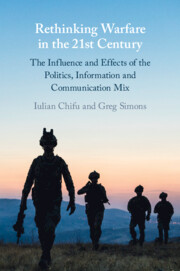 Rethinking Warfare in the 21st Century
Rethinking Warfare in the 21st Century Book contents
- Rethinking Warfare in the 21st Century
- Rethinking Warfare in the 21st Century
- Copyright page
- Dedication
- Contents
- 1 Introduction: Motivation, Purpose and Structure of the Book
- 2 Informational Warfare: A Theoretical Approach
- 3 Understanding Political and Intangible Elements in Modern Wars
- 4 The Fourth Generation of Informational Warfare
- 5 The Culture and Language of Contemporary Armed Conflict
- 6 Different Shades of Information and Communication in Armed Conflict: White, Grey and Black
- 7 The Effects of Technological Evolution and Social Media on the Individual, Society and Politics
- 8 Western Hybrid Warfare: Crisis and Subversion in Regime Change
- 9 Geopolitics in the Age of Social Media: The Struggle for Influence on Ukraine
- 10 The Ukrainian and Syrian Conflicts: Civil Wars or Geopolitical Shatterbelts?
- 11 The Impact of the COVID-19 Pandemic on Humankind, Society, and Politics
- 12 Conclusion: Summing Up the Knowledge and Answering the Questions
- Index
- References
12 - Conclusion: Summing Up the Knowledge and Answering the Questions
Published online by Cambridge University Press: 29 June 2023
- Rethinking Warfare in the 21st Century
- Rethinking Warfare in the 21st Century
- Copyright page
- Dedication
- Contents
- 1 Introduction: Motivation, Purpose and Structure of the Book
- 2 Informational Warfare: A Theoretical Approach
- 3 Understanding Political and Intangible Elements in Modern Wars
- 4 The Fourth Generation of Informational Warfare
- 5 The Culture and Language of Contemporary Armed Conflict
- 6 Different Shades of Information and Communication in Armed Conflict: White, Grey and Black
- 7 The Effects of Technological Evolution and Social Media on the Individual, Society and Politics
- 8 Western Hybrid Warfare: Crisis and Subversion in Regime Change
- 9 Geopolitics in the Age of Social Media: The Struggle for Influence on Ukraine
- 10 The Ukrainian and Syrian Conflicts: Civil Wars or Geopolitical Shatterbelts?
- 11 The Impact of the COVID-19 Pandemic on Humankind, Society, and Politics
- 12 Conclusion: Summing Up the Knowledge and Answering the Questions
- Index
- References
Summary
The Conclusion summarises the sum of the individual parts of the knowledge contained across the ten chapters of this book. This is done by answering the three research questions that were posed in the Introduction of the book.
Keywords
- Type
- Chapter
- Information
- Rethinking Warfare in the 21st CenturyThe Influence and Effects of the Politics, Information and Communication Mix, pp. 341 - 352Publisher: Cambridge University PressPrint publication year: 2023
